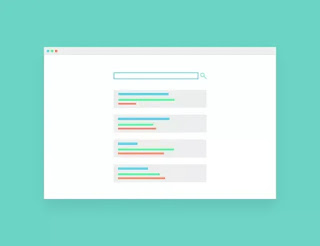Here's the complete guide for long tail keywords and short tail keywords
If you have a new blog or a website, you would want to rank on Google and get more traffic. And, if to want to rank, you have to focus on keywords.
So, here we have some of the most important topics related to keywords, i.e. what is a keyword, what is a long tail keyword and a short tail keyword, advantages, and disadvantages of both, and finally, are long tail keywords better.
So, first, let's see what is a keyword.
Table of contents
- What is a keyword
- What is a short tail keyword
- Should you try ranking for short tail keywords
- What is a long tail keyword
- Should you target long tail keywords
- Advantages of long tail keywords
- Advantages of short tail keywords
- Disadvantages of long tail keywords
- Disadvantages of short tail keywords
- So, does long tail keyword research still work?
- Conclusion
What is a keyword?
A keyword is a phrase that is searched on Google by people. For example, you searched on Google - 'What is blogging'. Here, 'what is blogging' is a keyword.
Similarly, when you buy a t-shirt, to search 'but T-shirts'. Here also, 'but T-shirts' is a keyword.
Now, based on its length, a keyword can be divided into a short tail keyword or a long tail keyword. So, now let's move on to sort tail keywords.
What is a short tail keyword?
As I've already told to, keywords, based on their length, can be divided into a short tail keyword or a long tail keyword.
Sorry tail keywords are those keywords that have a length of about 1-3 words. These keywords generally have a high search volume which means that many people search for them.
And 99% of the time, they are highly competitive. This is because many people have already written content on them and ranked for them.
Therefore, if to have a new blog or a website, to should never target short tail keywords.
Let's look at some examples of short tail keywords.
To already know, sorry tail keywords consist of 1-3 words, here are some examples.
- Blogging
- Search engine optimization
- Food
- Technology
- Medium
- Television
- Digital marketing
- Keyword research
Should you try ranking for short tail keywords?
I've already told you that if you target short tail keywords as a beginner, you'll never rank.
The reason is that many people would have already ranked for the short tail keyword you are working upon.
And beating them as a beginner is almost impossible. I said almost impossible because, in SEO, many other factors that affect your ranking, but the main factor is keywords.
So, you should never target short tail keywords if you have a new blog or website.
Now, let's move on towards long tail keywords.
What is a long tail keyword?
So, as you already know short tail keywords are generally made by 1-3 words.
Therefore, keywords that have a length of more than three words are known as long-tail keywords. For example, you searched on Google 'how to find long tail keywords for SEO'. Here, 'how to find long tail keywords for SEO' is a long tail keyword.
For your better understanding, here some more examples of long tail keywords.
- how to optimize a site for search engines
- digital marketing courses online
- how to make a new bank account
- complete guide to success in blogging.
All these are long tail keywords
Generally, long tail keywords have low competition. But sometimes long tail keywords also can have a high competition like short tail keywords.
For example, 'how to find long tail keywords' is a long tail keyword, and has a ranking difficulty of 87
Should you target long tail keywords?
The answer is YES! You should definitely target long tail keywords if you have a new blog or website.
The reason you should target long tail keywords for a new blog or website is that as the age of your website increases, you gain more trust by search engines. And gaining trust leads to higher rankings.
One more reason why you should target long tail keywords is that not all the people have worked or are working upon the keyword you are working upon and that means less competition which leads to higher rankings and more traffic.
And when you become a famous blogger, you can target short tail keywords because you would already have a lot of traffic by then.
Till now, we've seen the difference between long tail keywords and short tail keywords, and which one of them should you target.
ALSO READ: Is SEO worth it for small businesses?
So, let's move towards the advantages and disadvantages of long tail keywords and short tail keywords.
Advantages of long tail keywords
1. Long tail keywords help to move ahead of the competition.
Yes, long tail keywords can help you a lot in ranking and getting more traffic. Although, these keywords have a low search volume, they are less competitive.
One more reason why they are less competitive is that many bloggers focus on short tail keywords as they have a high search volume.
But if you target long tail keywords, to get an advantage as less competitive means you can rank easily for mulitple long tail keywords on the same page.
2. Long tail keywords bring in quality traffic.
Quality traffic means that they bring in organic traffic. Google respects and recognizes organic traffic as 'quality traffic'.
These keywords sbring in quality traffic as people generally search their queries in the form of long tail keywords.
For example, a person wants to learn how to find long tail keywords for SEO. Now, he will not search 'Long tail keywords for SEO', he will search 'how to find long tail keywords for SEO'.
And this is a long tail keyword. So, if you write something on 'how to find long tail keywords for SEO', and get ranked, to easily gain a good amount of quality i.e. organic traffic.
3. Long tail keywords have higher conversations.
If you are an affiliate marketer and want traffic so that the visitors buy something through your affiliate link, these keywords are the best for you.
Long tail keywords are more specific to tell the user what exactly they get in a blog post or a website. For better understanding, you can take a look at the example above in the second advantage.
Now, if the user searches for something specific, and you have already written something on that, he/she lands on your site if you get ranked. And if you have promoted a product which can help the person in that query, he/she buys it.
This is called a conversion and this is how long tail keywords have higher conversion rates.
There are many other advantages of long tail keywords, but here we'll only see the main 3 ones.
Now, let's move towards the advantages of short tail keywords.
Advantages of short tail keywords
1. Short tail keywords have a higher search volume.
Although, short tail keywords have very high competition, they can get you a lot of traffic as they have a very high search volume. For example, the short tail keyword 'SEO' has a search volume of about 27000 per month. That's a huge number.
2. They attract tons of organic traffic
Yes, short tail keywords are very competitive but if you get ranked for them, you'll get literally tons of organic traffic every day as they have a high search volume. But, remember that it is not easy to talk for short tail keywords.
These were the 2 advantages of short tail keywords. And unfortunately, there are no more advantages to it.
So let's move towards the disadvantages of both of them.
Disadvantages of long tail keywords
1. Low search volume
Although long tail keywords are easy to talk for, they have a low search volume. Their search volume generally takes from 100 - 500 searches per month. So, if rank for them, you get quality traffic, but not much of it.
Don't expect more disadvantages of long tail keywords, because there are no more.
Disadvantages of short tail keywords
1. Short tail keywords are highly competitive.
Short tail keywords have a very high search volume but they have a very high difficulty level too. You already know the reason that is too many people have already worked upon the short tail kewyords you are working upon.
2. Lower conversion rates
Short tail keywords have a very high search volume, but they are not specific. This means that content written on long tail keywords can confuse the user in the search results that what exactly does a post contains. For example- Is a user searches 'SEO', he/she does not know what content does a post contain. It may contain the meaning of SEO, types of SEO, etc.
Now, if the user wants to know about keywords in SEO, and he/she lands on a page with only the meaning of SEO, he/she will not buy anything from that page.
These were some of the most important disadvantages of short tail keywords.
So, does long tail keyword research still work?
The answer is yes, as long tail keywords still work, researching and using them also helps you in ranking higher on search engines.
Conclusion
In this post, we saw what are long tail keywords and short tail keywords, when should we target and not target them, and finally advantages of long tail keywords and short tail keywords. This post also answers other questions like are long tail keywords better and why are long tail keywords important for SEO.







Nice content...share it
ReplyDeleteo2kipathshala